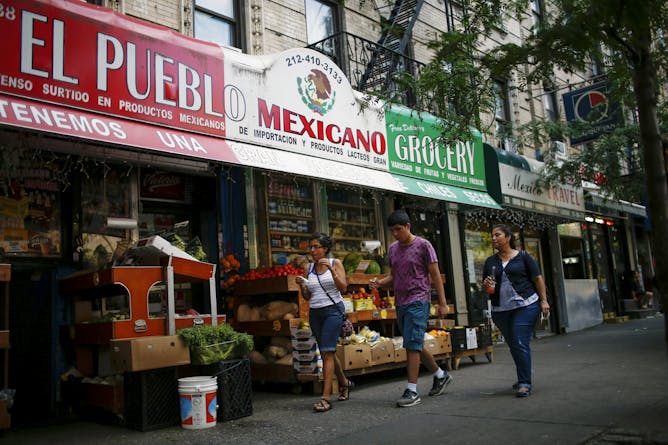
Once lauded for their vision and promise, Silicon Valley giants have made life so hard for locals that residents regularly protest the companies, including their amenities like charter buses to save workers from the region’s terrible traffic.
AP Photo/Richard Jacobsen
Andrew L. Russell, SUNY Polytechnic Institute; Lee Vinsel, Virginia Tech
Big technology firms are becoming known for mistreating workers, customers and society as a whole. Is an economic powerhouse about to collapse like Detroit did years go?
|

Trump leaving the G7 meeting.
Reuters/Jonathan Ernst
Kelly McFarland, Georgetown University
NATO leaders meet in Belgium today; many are worried about US President Trump's habit of breaking diplomatic norms. History is filled with other leaders acting bullishly, often with poor results.
|

New York City is one of the world’s most cosmopolitan cities, with 37 percent of its population foreign-born.
Reuters/Eduardo Munoz
Ernesto Castañeda, American University
A sociologist interviewed hundreds of immigrants in New York, Barcelona and Paris. Here's what they say those cities get right — and do wrong — when integrating foreign-born residents.
|
|
|
Health + Medicine
|
-
Joan Y. Meek, Florida State University
As US mothers returned to breastfeeding, the market for infant formula dried up, leading formula makers to seek new markets in developing nations. Here's how that led to a recent outcry.
-
Chris Waters, Michigan State University
Triclosan, an ingredient in soap and many household cleansers, has gained a bad reputation. A recent study looking for a way to boost an antibiotic, however, found that tricloscan did a great job.
|
|
|
|
|
|
|
|
|
|
Today’s chart
|
-

 |
Andrew D. Hwang
College of the Holy Cross
|
| |